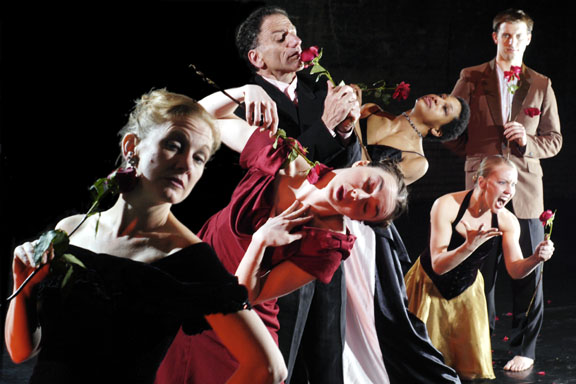Chair, Sandbag, Rose: No Prescriptions
Lightsey Darst saw the Stuart Pimsler company's performance at the Red Eye; there's more this weekend, Dec 2 - 4. The work is resonant, and a wecome respite from holiday fare.

“Chair, Sandbag, Rose”
Stuart Pimsler Dance and Theater
Red Eye Theater
Nov 25-27 & Dec 2-4 “Chair, Sandbag, Rose” isn’t the title of any one piece in Stuart Pimsler Dance & Theater’’s latest concert. Instead, it refers to prominent props used in three of the four pieces, and the phrase becomes shorthand for the elements of modern life.
First, the chairs. “His/Hers” (choreographed by New York artist David Gordon) opens with folding chairs scattered all over the Red Eye’s long stage. They sit or lie in all stages of fold and unfold: erect, tentatively half-open, nearly closed as if preparing to take a tiny step, or flat on the stage, like victims. Before the dance begins, the chairs are set up and become alternate seating, yet the charm and poignancy of that image remains.
“His/Hers,” a talking-dancing piece in which real life partners Suzanne Costello and Stuart Pimsler re-enact a kitchen conversation from opposite sides of a bright yellow line, could easily be the beginning of something tiresome—a long inspection of someone’s else private relationship. But understand that it’s a short glimpse and you’ll see its quiet merit and low-key achievement: Gordon renders a relationship on stage without adding drama. Words—snatches of ordinary conversation—and movements—gestures, tentative and unconnected steps—interchange, with neither taking the lead; the argument never escalates or arrives at a false conclusion. “I’m sick of chicken,” Costello complains; the couple mime swimming. “This tea you got me—it’s bland,” complains Pimsler; she balances and he tries three small, whimsical steps. Pimsler and Costello both perform wonderfully as themselves—and the self is always the hardest part to play.
“He, He & He,” the only piece without prominent props, shows Pimsler’’s own light touch. Three men (William Gladden, Cade Holmseth, and Jesse Walker, all at once energetic and natural) imitate each other and engage in fanciful dialogue, comparing each other to horses, birds, and gods (“He looks like Seabiscuit”), in a pantomime of performed masculinity that’s witty, not scathing. When the men gather at the back of the stage, shouting for “Mom!” and quivering, you feel empathy, not pity or scorn. Here too dance and words mix well.
For “Sentry,” sandbags litter the stage, their weight like bodies. Dancers step in formation while one calls out numbers in French; then they break from drill into real war, wincing and shaping with their hands their wounds. They snap back into formation; they fall apart. They heft the sandbags, trying to plug an unfathomable gap; they reel in pain and fear; they guard in falling dark. For all the inherent drama, “Sentry” is a quiet piece, more about soldiers than about any particular turn of history.
In conjunction with Wynn Fricke’s “Lament” (seen in Minnesota Dance Theatre’s recent concert), “Sentry” makes me wonder how dancers are like soldiers. Both are highly physically trained; both give up control over their bodies. Dancing death rolls is as cool as shooting guns—especially if, like Cade Holmseth and Roxane Wallace, you can throw yourself entirely off the ground.
This is not to imply that “Sentry” glorifies war, or that there aren’t some important differences between dancers and soldiers. Rather, the dancers’ empathy with soldiers—their imaginative understanding of the lure, the discipline, and the pain of soldiering—makes “Sentry” true and noble, and a more powerful antiwar statement than anything topical. In sending young people off to fight and die, we use them as if they were sandbags, as if their promise and courage were of no account. Here, though, this physically dazzling company reenacts and honors their lives.
Roses, finally, wind up the trio of props, strewn across the stage for “Petali Freschi de Amore.” Suzanne Costello’’s faux-Italian discourse on new love alternately charms and annoys, but “Petali Freschi” is kept delightful by delirious partnering, silly scenarios, romantic music (at first played on a handheld device and used as a pointer into the dance), and cheerful clowning from the dancers—especially the charismatic Jesse Walker and flirty Vanessa Voskuil.
With “Chair, Sandbag, Rose,” Stuart Pimsler Dance and Theater offers not a prescription for but a reflection of our lives— the slow accommodation of mature relationships, the safety ensured by others, the wild energy of new love. Showing us as we are, but lightly and without judgment, “Chair, Sandbag, Rose” is an alternative to the season’s idealistic holiday shows, which every year try and fail to change us.